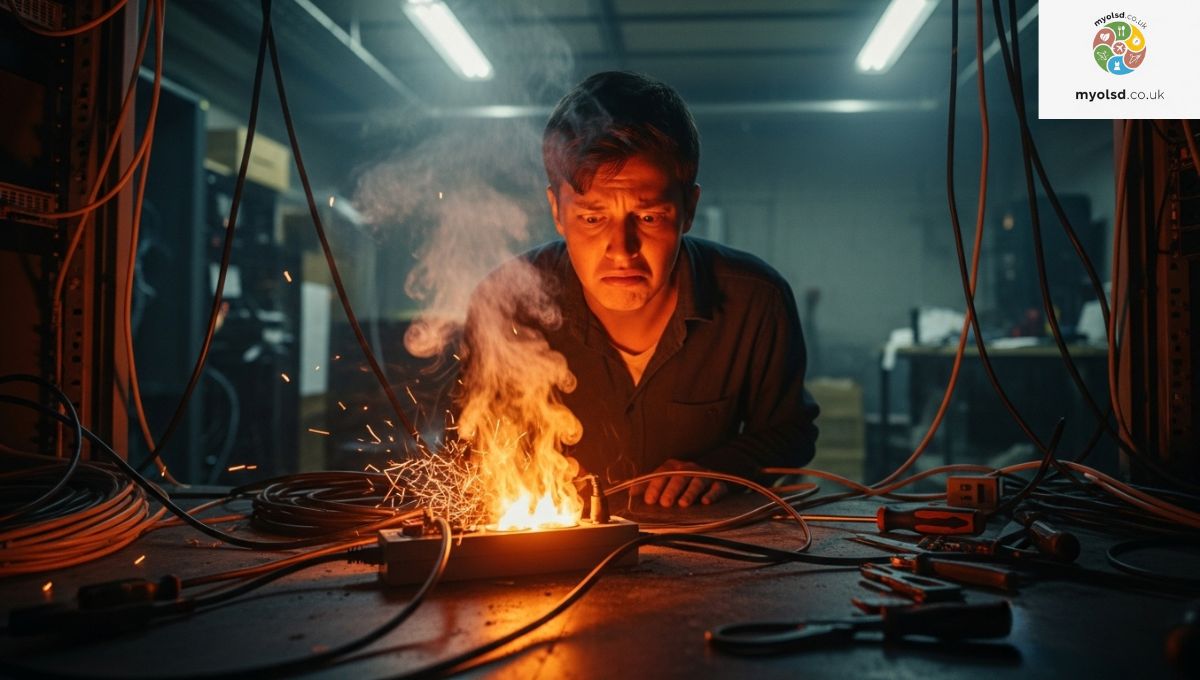Ever caught a strange, burning odor at home and instantly wondered, What does an electrical fire smell like? It’s one of those moments that makes your heart skip a beat because you’re not sure if it’s just something minor or a real danger. The worry alone can be stressful, and ignoring it isn’t an option when your safety’s on the line.
In this post, we’ll walk you through what an electrical fire really smells like, why those odors happen, and the warning signs you shouldn’t ignore. You’ll also learn what steps to take if you ever notice them in your home. By the end, you’ll know exactly how to spot the problem early and keep your family safe.
What Are the Signs Of An Electrical Fire?
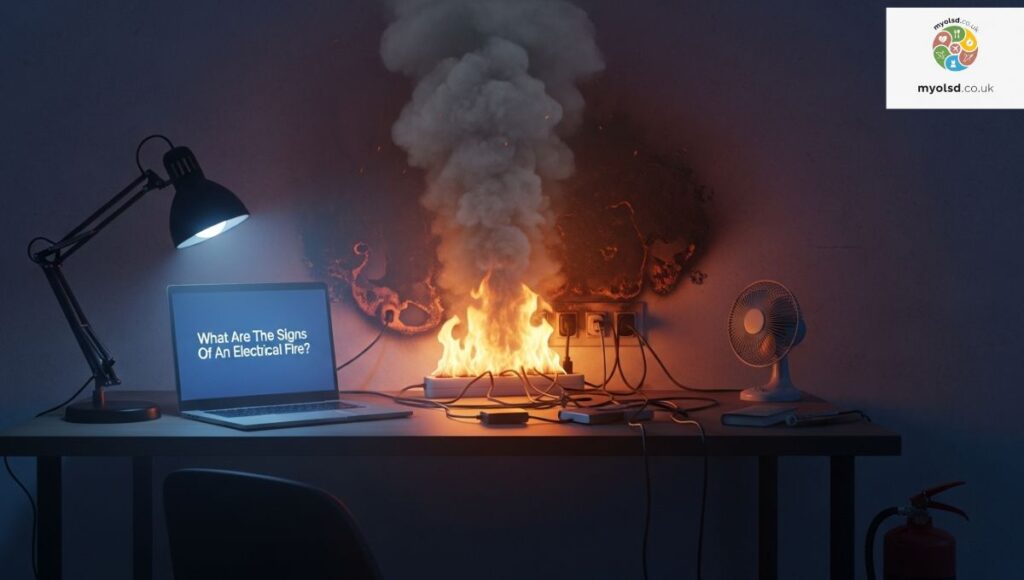
You don’t always see an electrical fire coming, but your nose and ears may pick up clues. Identifying early signs is critical to stopping damage before it spreads.
1. Persistent Burning Smell From Unidentifiable Source
If you notice a burning smell that lingers but can’t find the source, it could be hidden wiring. Unlike food left in the oven, this odor doesn’t fade quickly. It often indicates overheated wires behind walls or ceilings.
2. Frequent Tripping Circuit Breakers
Circuit breakers are designed to protect your home. When they trip repeatedly, it’s often due to overloaded circuits or faulty wiring. If it’s accompanied by a burning smell, consider it a serious warning.
3. Charred Or Discolored Outlets And Switches
Visible warning signs include discoloration, scorch marks, or melted plastic near outlets and switches. These usually emit a faint burning or acrid smell.
4. Sizzling Sounds
Never ignore electrical buzzing, sizzling, or crackling sounds. These sounds suggest arcing electricity jumping across gaps, which is a fire hazard.
5. Sparks, Flames, or Melted Plastic
Obvious sparks or melted plastic around fixtures are late-stage signs of danger. By the time you see this, you’re already at risk of fire spreading.
What Does an Electrical Fire Smell Like?
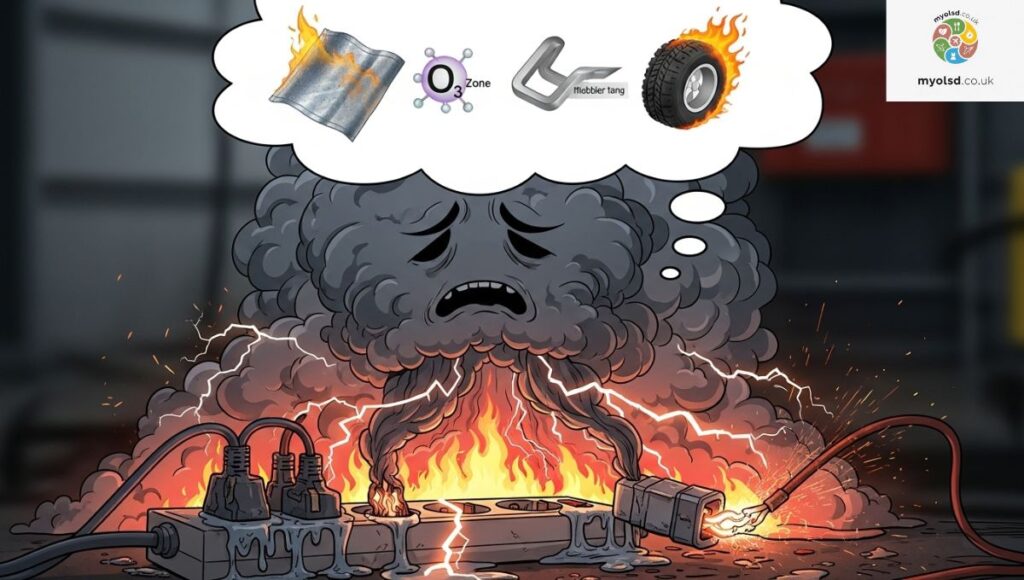
So, what does an electrical fire smell like exactly? Most people describe it as a mix of:
- Burning plastic — from wire insulation or appliance casings
- Rubber odor — when cords and protective covers overheat
- Fishy smell — caused by overheating electrical components releasing chemicals
- Metallic scent — when wiring, sockets, or breakers burn
This smell is sharp, acrid, and unpleasant. Unlike cooking odors, it doesn’t fade quickly. In fact, it often lingers until the underlying issue is fixed. If you detect the smell, act immediately switch off appliances, turn off the breaker, and contact a licensed electrician.
Read more Article:What Is Telecom Solutions?
Causes Of Electrical Burning Smells
There are several reasons why you might catch a burning electrical odor. Some are common, while others are hidden dangers.
- Faulty wiring: Loose connections or frayed wires generate heat.
- Overloaded circuits: Too many appliances on one outlet stress the system.
- Outdated electrical panels: Old systems weren’t built for today’s power demands.
- Damaged outlets or switches—cracked, worn, or corroded can easily spark.
- Appliance malfunction: Refrigerators, dishwashers, or HVAC units can overheat internally.
- Moisture exposure: Rainwater leaks or humidity can corrode wires, increasing fire risk.
Each of these issues creates heat and weakens insulation, which produces the distinct burning smell you should never ignore.
Identifying The Source Of An Electrical Burning Smell
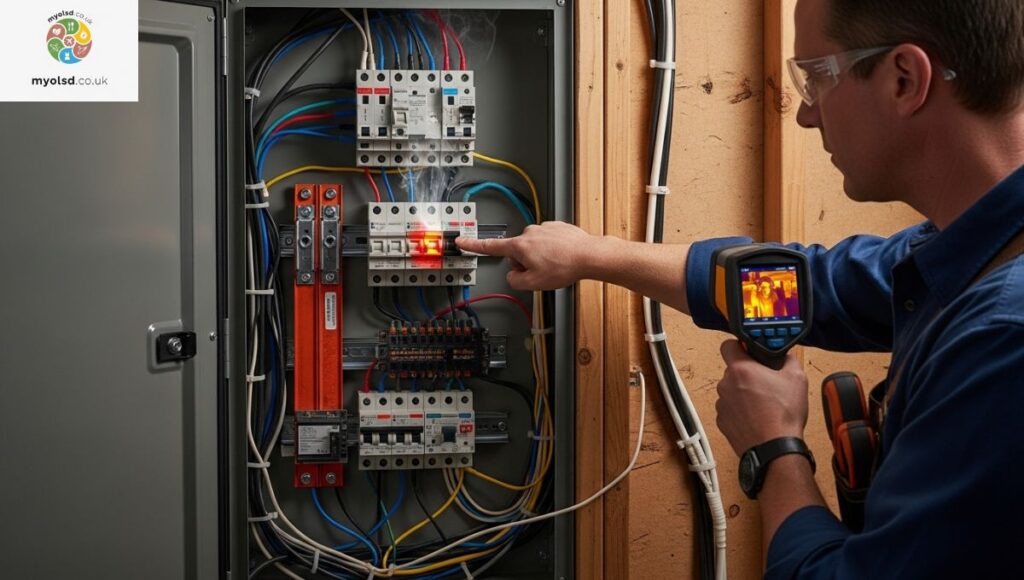
Tracking down the origin of an electrical odor isn’t always simple. Begin by turning off all appliances in the affected area. If the smell continues, check outlets, switches, and extension cords for heat, discoloration, or buzzing.
If the smell comes from walls or ceilings, that’s a more serious issue. Hidden wiring problems can spark behind drywall. In that case, don’t try to open walls yourself. Call a professional electrician who can use tools to locate faulty wiring without causing damage.
Understanding Common Causes Of Electrical Fires
The U.S. Fire Administration reports that over 44,000 residential electrical fires occur each year, causing more than $1.5 billion in property damage and 400 deaths annually. Common culprits include:
- Short circuits
- Worn-out or deteriorated wires
- Overloaded extension cords
- Old electrical systems
- Improper installations during renovations
Often, these issues remain unnoticed until a burning smell appears. By then, the fire risk is real and immediate.
Are Electrical Fires Common In Homes?
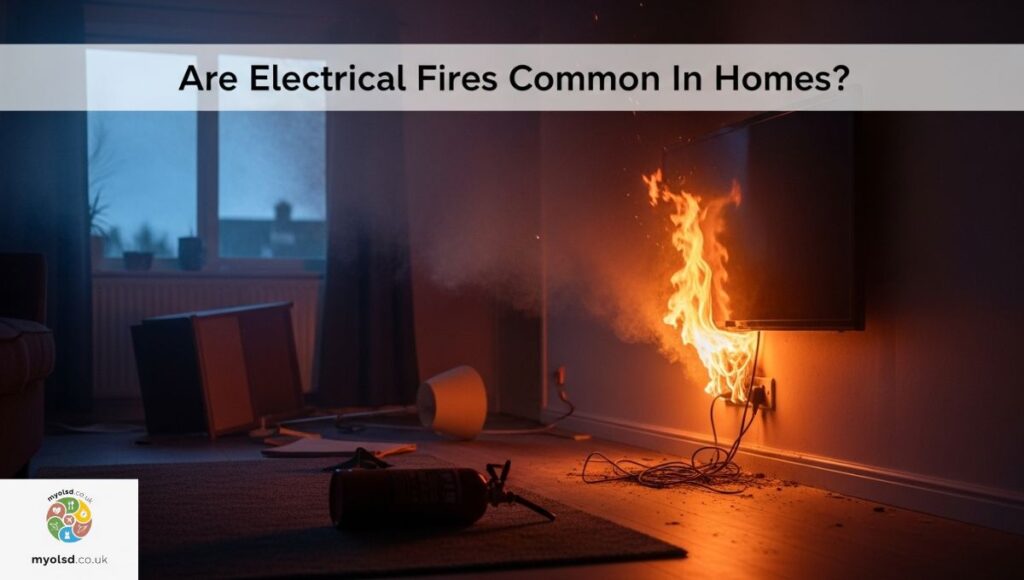
Unfortunately, yes. Electrical fires rank among the leading causes of residential fires globally. They are especially common in homes with:
- Outdated wiring systems
- Overloaded outlets from modern appliances
- Lack of regular electrical inspections
Since electrical systems are hidden behind walls, homeowners may not notice problems until it’s too late. That’s why recognizing smells and small warning signs is so important.
How Do Electrical House Fires Start?
Most electrical fires start with heat buildup. Electrical wires and components are built to handle a safe load. When they’re damaged, old, or overloaded, heat builds up until insulation burns, releasing smoke and fumes.
How Long Does Electrical Burning Smell Last In a House?
Depending on the intensity, the odor can linger for hours or even days. If wires are still overheating, the smell won’t go away until repairs are made.
How To Get Rid Of The Electrical Burning Smell?
First, shut off the main breaker. Then ventilate by opening windows and using fans. But remember: removing the smell doesn’t fix the root cause; only an electrician can.
Is Electrical Burning Smell Toxic?
Yes. Burning plastic and rubber releases chemicals such as benzene, carbon monoxide, and hydrogen cyanide, which may cause dizziness, nausea, and breathing irritation.
Preventive Measures And Solutions
Preventing electrical fires starts with proactive safety steps:
- Schedule regular electrical inspections with a licensed electrician
- Replace old wiring if your home is more than 30 years old.
- Use surge protectors for sensitive electronics
- Never overload extension cords or power strips
- Ensure smoke detectors are installed in all key locations of your house.
- Keep an electrical fire-rated extinguisher readily accessible at all times.
Remember: never try to put out an electrical fire with water. Use a fire extinguisher or immediately contact emergency services.
Call Varela American Electric For An Inspection

If you detect a burning electrical odor, act immediately and don’t take any risks. Varela American Electric provides professional inspections and maintenance to protect your home. Their licensed electricians can spot problems before they escalate and bring your wiring up to current safety codes. Acting early can save your property and possibly your life.
Conclusion
Knowing what does an electrical fire smells like can literally save lives. From burning plastic to acrid fishy odors, these smells are warning signs that should never be ignored. Electrical fires may start silently, but their dangers escalate fast. By learning the signs, understanding the causes, and scheduling regular inspections, you can keep your home safe.
FAQS
What smell indicates an electrical fire?
A burning plastic, rubber, or fishy odor often indicates an electrical fire.
What are the signs of an electrical fire?
Frequent breaker trips, burning smells, discolored outlets, and sizzling sounds are signs of an electrical fire.
Is the electrical burning smell harmful?
Yes, it’s harmful because it releases toxic fumes and signals a fire risk.
What does electricity smell like?
Electricity itself has no smell, but overheating wires produce a sharp burning odor.

